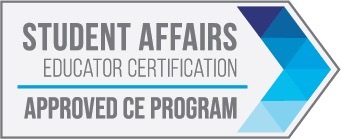
Using cocurricular data to predict and enhance student success metrics
- Registration Closed
Predictive analytics models can be used to assist colleges and universities in meeting their strategic goals. Often, the focus of such models is on student academic and demographic data, but some of the most impactful experiences are co-curricular. The presenters will focus on models that include the co-curricular aspects of the learning environment in predictive models and report on institutional changes enacted because of such models.
Learning Outcomes:
- Identify a variety of cocurricular practices that have a positive impact on student success metrics.
- Evaluate the strengths and weaknesses of using cocurricular data in predictive models.
- Discuss models that could be explored on their own campuses.
Dr. Jessica Oyler
Vice President for Student Access and Success
Weber State University
Dr. Jessica Oyler is the Vice President for Student Access and Success and works with enrollment and student success areas. She's passionate about ensuring that everyone at Weber has the opportunity to be successful, and three of her kiddos attend or have graduated from Weber. Her bachelor's was in agricultural education, but she eventually got her doctorate in higher education administration, which goes to show the breadth of opportunities you have with your degree!
Dr. Heather J. Chapman
Senior Director for Data & Analytics
Weber State University
Heather Chapman is the Senior Director for Data & Analytics at Weber State University (WSU). She can read a spreadsheet, scatterplot, or line chart and loves finding ways to make complicated data problems easy for everyone to understand. She has a passion for creating visualizations that tell a good story to people who are afraid of or uncomfortable with all that data. Her team is responsible for providing operational reports, creating visualizations that explore student success, and predictive modeling at WSU. Heather is also responsible for teaching visualization best practices across her institution and for helping with the integration of new data sources into WSU’s data warehouse. Prior to joining WSU, Heather earned a Ph.D. in Experimental and Applied Psychological Sciences, with an emphasis in statistics from Utah State University.
Continuing Education Credits
This session counts for 1.0 CSAEd-CORE credit
NASPA has been approved by the Higher Education Consortium for Student Affairs Certification to provide CE credit for Certified Student Affairs Educators (CSAEd). NASPA is solely responsible for all aspects of this program.
Guidelines for earning CE credit:
No partial credit will be rewarded.
Credit is available for attending the live session or viewing the on-demand recording, not both. While on-demand is available to registrants for 365 days, CSAEd credits and certificates must be retrieved no longer than 60 days after the event (June 7, 2024).
To receive CSAEd credit, attendees must complete the feedback survey that offers the certification in each session. Once you have attended all the live sessions or watched the on-demand sessions for which you would like to request credit, visit the Continuing Education (CE) website to fill out the Student Affairs Education Certification Request Form for all the sessions. All certificants must fill out one for the live session and a separate one for the on-demand sessions.
Visit the Continued Education (CE) website to learn more regarding deadlines and receive your certificate of completion for the Virtual Conference.


